What does ashwagandha do for men?
It reduces stress. It relieves anxiety. But did you know that ashwagandha might also benefit your testosterone, sperm count, and physical strength?

We can confidently say that ashwagandha is one of the most popular botanical health products out there. You can find it in various forms at your local grocery store and even have it added to your drink at the juice bar. It’s even a hot topic on social media platforms like TikTok, where most uploaders tout its ability to reduce stress, boost brain function, and improve sleep.[1]
But ashwagandha is more than just a cure for cognition and calm.
In fact, something that a lot of people have overlooked is ashwagandha’s potential to support multiple areas of men’s health. It’s a topic that deserves more attention, which is why we want to highlight it here, along with other important details that ought to help you choose the right ashwagandha supplement for your needs.
First, what is ashwagandha?
Ashwagandha is an evergreen shrub, like the holly you might use to decorate your home around the winter holidays. Its botanical name is Withania somnifera, with somnifera coming from the Latin word for “sleep-inducing.”[1]
That should clue you in that ashwagandha has calming properties, which are the basis for its main (and most widely studied) uses:
-
Reducing stress, possibly owing to the ability to decrease cortisol levels[2] [3]
-
Improving sleep health, not only by decreasing cortisol but also by increasing the expression of sleep-related neurotransmitters[4]
- Improving cognitive function, which has an inverse relationship with chronic stress (the more stressed-out the person, the less flexible and capable their mind)[5] [6]
Ashwagandha’s benefits for men, specifically
While ashwagandha’s main uses can benefit most people generally, research now shows that it has additional effects that ought to interest men specifically. We’re mainly talking about its potential to increase testosterone levels and sperm counts, but also its ability to improve physical strength (not exclusively a male topic of interest, but a common motivator among men engaged in physical activity).[7]
The findings of these studies are worth examining in a little more depth.
Ashwagandha to boost testosterone
Published in 2021, a review of the effects of different herbs in men found that ashwagandha was one of only two supplements (the other was fenugreek) that increased testosterone levels.[8] The following year saw publication of a placebo-controlled study where 600mg of KSM-66 ashwagandha per day led to “statistically significant increase[s] in serum testosterone levels.”[9] Cellular and animal studies have demonstrated that this testosterone-raising effect is due to ashwagandha’s ability to increase levels of a different hormone (GnRH) that eventually leads to the production of the main male sex hormone.[10]
Ashwaghanda and sperm count
Testosterone initiates spermatogenesis, or the process by which the testes produce sperm cells. Therefore, an increase in testosterone should bring about a corresponding increase in sperm.[9] Several studies have validated this cause-and-effect relationship, such as a 2013 study that saw a 167% boost in sperm quantity in men who took ashwagandha.[11]
Ashwagandha for physical strength
In 2015, a placebo-controlled trial of 57 men aged 18-50 found that the ashwagandha group yielded “significantly greater increases” in muscle strength and size.[12] Since then, the literature on the subject has burgeoned with multiple reviews that have come to the same conclusion: ashwagandha supplementation is associated with improvements in numerous physical fitness parameters, including muscle strength and recovery.[4] [13] [14]
A matter of withanolides (and branded extracts)
Both the general and the male-oriented benefits of ashwagandha are likely due to a group of naturally occurring steroids called withanolides. Generally, the more withanolides, the stronger the effects. This was demonstrated in a 2025 study on the bioavailability of four standardized ashwagandha extracts with the same dose of withanolides at different concentrations: in the body, higher concentrations yielded increasingly greater absorption rates, with the highest concentration (35%) being 118 to 267 times more bioavailable than the others.[15]
Supplement companies that use ashwagandha often use branded extracts with standardized concentrations (that means the withanolide content is consistent, so consumers get predictable outcomes with every dose). The three best-known brands are:
-
KSM-66: 5% concentration and well-studied, with approximately 300-600mg doses successfully producing stress and anxiety benefits, as well as increases in testosterone, sperm count, and physical strength[16] [9] [11] [12]
-
Sensoril:10% concentration, but with a significant amount of oligosaccharides, which aren’t appropriate for people with certain digestive disorders
- Shoden: 35% concentration, making it the most potent branded extract on the market with a potency that matches the ashwagandha that performed so well in the study above
To give some perspective: in a 600mg dose of ashwagandha, KSM-66 would deliver 30mg of withanolides; Sensoril, 60mg; and Shoden, 210mg.
Choosing the right ashwagandha supplement
Even with Shoden being the strongest standardized brand of ashwagandha, that doesn’t make it the best option for every health goal. In fact, some research suggests that a more moderate concentration is better for increasing energy levels.[17] Also, it’s KSM-66 that happens to be the most frequently used brand in the studies we’ve referenced on testosterone, sperm, and physical strength.[9] [11] [12] So, if your goals are related to these areas, then KSM-66 in the 300-600mg range should give you the advantage in reaching them. Or, at the very least, it would be the most effective form for the largest number of people, ashwagandha newbies and long-time users alike.
But for a stronger impact (say, for a more pronounced hit of stress relief or mental focus), Shoden’s higher withanolide concentration might be the one instead. Essentially, it would give you more withanolides per dose, so you’d need less ashwagandha to start with: around 100-120mg. That would also leave room in the capsule for other stress-reducing or brain-boosting ingredients without having you take more pills than you can reasonably handle.
Innerbody Labs accounted for the distinct uses of the different branded extracts when it formulated three different supplements — Testosterone Support, Sleep Support, and Focus Support — utilizing ashwagandha alongside additional ingredients that have been shown to be effective in relevant clinical studies (like fenugreek and tongkat ali for testosterone, L-theanine and saffron for focus and sleep). If you’re singularly focused on men’s health, then Testosterone Support alone may provide you with the ingredients and doses you want. But don’t overlook the importance of sleep for sustaining your testosterone levels, or of testosterone’s relationship to cognitive function.[18] [19] They’re all connected in your complex biochemical ecosystem.
Sources
-
National Institutes of Health, Office of Dietary Supplements. (2025). Ashwagandha: Is it helpful for stress, anxiety, or sleep?. NIH.
-
Speers, A. B., et al. (2021). Effects of Withania somnifera (Ashwagandha) on stress and the stress-related neuropsychiatric disorders anxiety, depression, and insomnia. Current Neuropharmacology, 19(9), 1468-1495.
-
Kurant, D., et al. (2023). Can ashwagandha benefit the endocrine system? — a review. International Journal of Molecular Sciences, 24(22), 16513.
-
Sprengel, M., Laskowski, R., & Jost, Z. (2025). Withania somnifera (Ashwagandha) supplementation: A review of its mechanisms, health benefits, and role in sports performance. Nutrition & Metabolism, 22, 9.
-
Ng, Q. X., et al. (2020). A systematic review of the clinical use of Withania somnifera (Ashwagandha) to ameliorate cognitive dysfunction. Phytotherapy Research, 34(3), 583-590.
-
Girotti, M., Bulin, S. E., & Carreno, F. R. (2024). Effects of chronic stress on cognitive function — from neurobiology to intervention. Neurobiology of Stress, 33, 100670.
-
Reading, J. M., & LaRose, J. G. (2020). Exercise preferences among emerging adults: Do men and women want different things? Journal of American College Health, 70(5), 1301-1305.
-
Smith, S. J., et al. (2021). Examining the effects of herbs on testosterone concentrations in men: A systematic review. Advances in Nutrition, 12(3), 744-765.
-
Chauhan, S., Srivastava, M. K., & Pathak, A. K. (2022). Effect of standardized root extract of ashwagandha (Withania somnifera) on well-being and sexual performance in adult males: A randomized controlled trial. Health Science Reports, 5(4), e741.
-
Lopresti, A. L., Drummond, P. D., & Smith, S. J. (2019). A randomized, double-blind, placebo-controlled, crossover study examining the hormonal and vitality effects of ashwagandha (Withania somnifera) in aging, overweight males. American Journal of Men's Health, 13(2), 1557988319835985.
-
Ambiye, V. R., et al. (2013). Clinical evaluation of the spermatogenic activity of the root extract of ashwagandha (Withania somnifera) in oligospermic males: A pilot study. Evidence-Based Complementary and Alternative Medicine, 2013, 571420.
-
Wankhede, S., et al. (2015). Examining the effect of Withania somnifera supplementation on muscle strength and recovery: A randomized controlled trial. Journal of the International Society of Sports Nutrition, 12, 43.
-
Jayawardena, R., Weerasinghe, K., & Sooriyaarachchi, P. (2025). The effect of Ashwagandha (Withania somnifera) on sports performance: A systematic review and meta-analysis. Turkish Journal of Sports Medicine, 60(2), 64-73.
-
Guo, S., & Rezaei, M. J. (2024). The benefits of ashwagandha (Withania somnifera) supplements on brain function and sports performance. Frontiers in Nutrition, 11, 1439294.
-
Rathi, P., & Kim, S. (2025). Randomized, double-blind, crossover study comparing the bioavailability of 4 ashwagandha (Withania somnifera (L.) Dunal) extracts in healthy adults under fasting condition. Current Therapeutic Research, 103, 100805.
-
Chandrasekhar, K., Kapoor, J., & Anishetty, S. (2012). A prospective, randomized double-blind, placebo-controlled study of safety and efficacy of a high-concentration full-spectrum extract of ashwagandha root in reducing stress and anxiety in adults. Indian Journal of Psychological Medicine, 34(3), 255-262.
-
Yang, L., Chen, X., & Gao, Y. (2022). Efficacy of different concentrations of withanolides in ashwagandha supplements for insomnia and enhancing energy level. Current Developments in Nutrition, 6(Suppl 1), 881.
-
Su, L., et al. (2021). Effect of partial and total sleep deprivation on serum testosterone in healthy males: A systematic review and meta-analysis. Sleep Medicine, 88, 267-273.
- Celec, P., Ostatníková, D., & Hodosy, J. (2015). On the effects of testosterone on brain behavioral functions. Frontiers in Neuroscience, 9, 12.

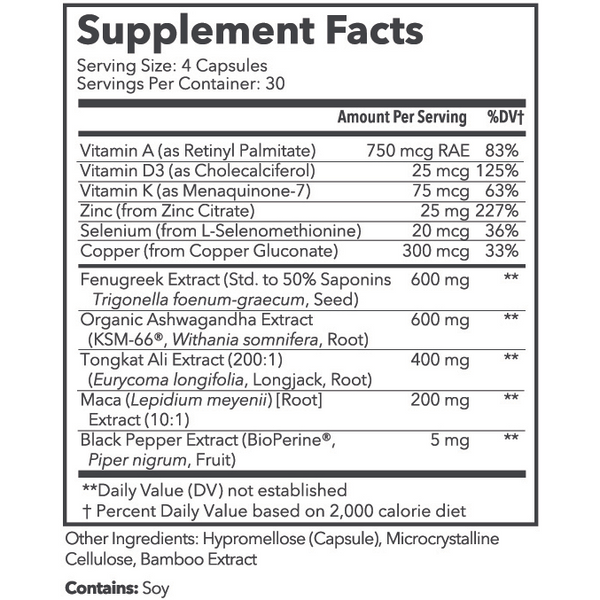
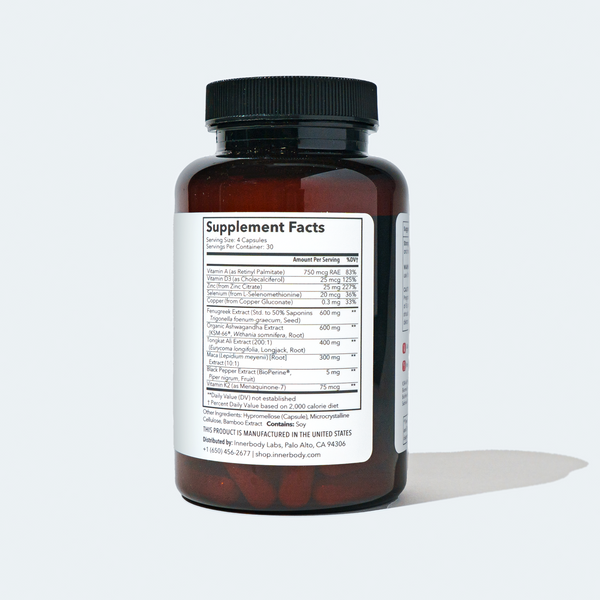
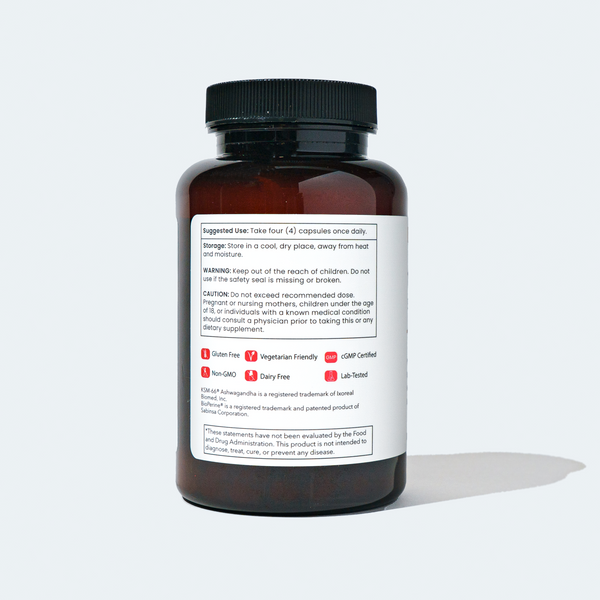
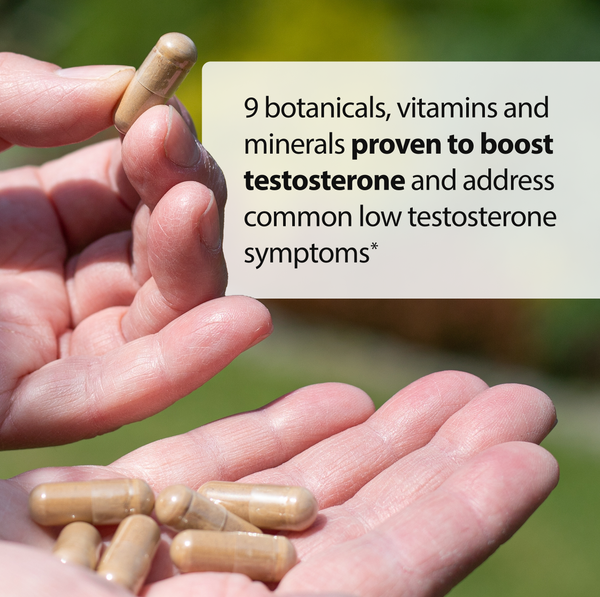
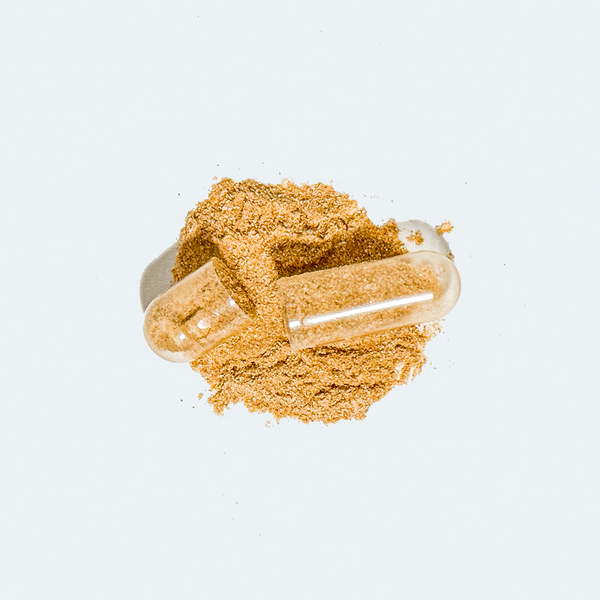
50 Reviews
Testosterone Support
$78.00
